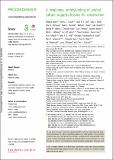Files in this item
A deepening understanding of animal culture suggests lessons for conservation
Item metadata
| dc.contributor.author | Brakes, Philippa | |
| dc.contributor.author | Carroll, Emma L. | |
| dc.contributor.author | Dall, Sasha | |
| dc.contributor.author | Keith, Sally | |
| dc.contributor.author | McGregor, Peter | |
| dc.contributor.author | Mesnick, Sarah | |
| dc.contributor.author | Noad, Michael | |
| dc.contributor.author | Rendell, Luke | |
| dc.contributor.author | Robbins, Martha | |
| dc.contributor.author | Rutz, Christian | |
| dc.contributor.author | Thorton, Alex | |
| dc.contributor.author | Whiten, Andrew | |
| dc.contributor.author | Whiting, Martin | |
| dc.contributor.author | Aplin, Lucy | |
| dc.contributor.author | Bearhop, Stuart | |
| dc.contributor.author | Ciucci, Paolo | |
| dc.contributor.author | Fishlock, Vicki | |
| dc.contributor.author | Ford, John | |
| dc.contributor.author | Notarbartolo di Sciara, Giuseppe | |
| dc.contributor.author | Simmonds, Mark | |
| dc.contributor.author | Spina, Fernando | |
| dc.contributor.author | Wade, Paul | |
| dc.contributor.author | Whithead, Hal | |
| dc.contributor.author | Williams, James | |
| dc.contributor.author | Garland, Ellen C. | |
| dc.date.accessioned | 2021-04-21T13:30:02Z | |
| dc.date.available | 2021-04-21T13:30:02Z | |
| dc.date.issued | 2021-04-28 | |
| dc.identifier | 273900466 | |
| dc.identifier | 9d768e84-adce-4e91-912c-8840442bca88 | |
| dc.identifier | 85105903979 | |
| dc.identifier | 000642210600006 | |
| dc.identifier.citation | Brakes , P , Carroll , E L , Dall , S , Keith , S , McGregor , P , Mesnick , S , Noad , M , Rendell , L , Robbins , M , Rutz , C , Thorton , A , Whiten , A , Whiting , M , Aplin , L , Bearhop , S , Ciucci , P , Fishlock , V , Ford , J , Notarbartolo di Sciara , G , Simmonds , M , Spina , F , Wade , P , Whithead , H , Williams , J & Garland , E C 2021 , ' A deepening understanding of animal culture suggests lessons for conservation ' , Proceedings of the Royal Society B: Biological Sciences , vol. 288 , no. 1949 , 20202718 . https://doi.org/10.1098/rspb.2020.2718 | en |
| dc.identifier.issn | 0962-8452 | |
| dc.identifier.uri | https://hdl.handle.net/10023/23070 | |
| dc.description | Funding and support as follows: Whale and Dolphin Conservation to P.B.; Royal Society New Zealand Rutherford Discovery Fellowship to E.L.C; Radcliffe Fellowship, Radcliffe Institute for Advanced Study, Harvard University, and Biotechnology and Biological Sciences Research Council grant no. [BB/S018484/1]to C.R.; Human Frontier Science Program grant no. [RGP00049] to A.T.; Royal Society University Research Fellowship grant no. [UF160081] to E.C.G. | en |
| dc.description.abstract | A key goal of conservation is to protect biodiversity by supporting the long-term persistence of viable, natural populations of wild species. Conservation practice has long been guided by genetic, ecological and demographic indicators of risk. Emerging evidence of animal culture across diverse taxa and its role as a driver of evolutionary diversification, population structure and demographic processes may be essential for augmenting these conventional conservation approaches and decision-making. Animal culture was the focus of a ground-breaking resolution under the Convention on the Conservation of Migratory Species of Wild Animals (CMS), an international treaty operating under the UN Environment Programme. Here, we synthesise existing evidence to demonstrate how social learning and animal culture interact with processes important to conservation management. Specifically, we explore how social learning might influence population viability, be an important resource in response to anthropogenic change and provide examples of how it can result in phenotypically distinct units with different, socially learnt behavioural strategies. Whilst identifying culture and social learning can be challenging, indirect identification and parsimonious inferences may be informative. Finally, we identify relevant methodologies and provide a framework for viewing behavioural data through a cultural lens which might provide new insights for conservation management. | |
| dc.format.extent | 10 | |
| dc.format.extent | 780536 | |
| dc.language.iso | eng | |
| dc.relation.ispartof | Proceedings of the Royal Society B: Biological Sciences | en |
| dc.subject | Cultural transmission | en |
| dc.subject | Social learning | en |
| dc.subject | Conservation management | en |
| dc.subject | Evolutionary significant units | en |
| dc.subject | Human-wildlife conflict | en |
| dc.subject | Population viability | en |
| dc.subject | QH301 Biology | en |
| dc.subject.lcc | QH301 | en |
| dc.title | A deepening understanding of animal culture suggests lessons for conservation | en |
| dc.type | Journal item | en |
| dc.contributor.sponsor | BBSRC | en |
| dc.contributor.sponsor | The Royal Society | en |
| dc.contributor.institution | University of St Andrews. School of Biology | en |
| dc.contributor.institution | University of St Andrews. Sea Mammal Research Unit | en |
| dc.contributor.institution | University of St Andrews. Centre for Social Learning & Cognitive Evolution | en |
| dc.contributor.institution | University of St Andrews. Centre for Biological Diversity | en |
| dc.contributor.institution | University of St Andrews. Marine Alliance for Science & Technology Scotland | en |
| dc.contributor.institution | University of St Andrews. Bioacoustics group | en |
| dc.contributor.institution | University of St Andrews. School of Psychology and Neuroscience | en |
| dc.identifier.doi | 10.1098/rspb.2020.2718 | |
| dc.description.status | Peer reviewed | en |
| dc.identifier.url | https://doi.org/10.6084/m9.figshare.c.5365209. | en |
| dc.identifier.grantnumber | BB/S018484/1 | en |
| dc.identifier.grantnumber | UF160081 | en |
This item appears in the following Collection(s)
Items in the St Andrews Research Repository are protected by copyright, with all rights reserved, unless otherwise indicated.

